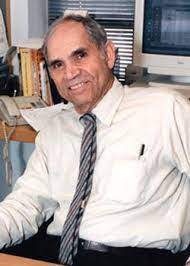Jacques Fresco died last December. I am kind of a scientific grandson of Jacques Fresco since he mentored my Ph.D. supervisor, Bruce Alberts when he (Bruce) was an undergraduate at Harvard.
While at Harvard, Jacques mentored then-undergraduate Bruce Alberts, who taught at Princeton from 1966 to 1976, served as president of the National Academy of Sciences and wrote the seminal textbook, “The Molecular Biology of the Cell.”In addition to reassuring Alberts’ parents that they shouldn’t worry about their son’s choice to pursue science instead of medical school — a story Fresco enjoyed telling — he also played a key role in bringing the young scientist to Princeton. “Before I had even completed my Ph.D., he convinced Princeton to offer me an assistant professorship that I did not deserve,” Alberts recalled. “And at Princeton for 10 years, we of course spent an enormous amount of time together. So Jacques was very central to my life as a scientist and a close friend.”
The Fresco lab was right above the Alberts lab when I started graduate school at Princeton in 1968. The main focus of the Fresco lab was the structure of tRNA and in order to isolate different tRNA molecules they needed a very large gel filtration column that was about 4m tall and about as big around as a dinner plate. The column was too tall for their lab so they had to drill a hole through the concrete floor and drop it down into the lab below!
One of my graduate student friends worked in the Fresco lab on hydrogen exchange in tRNA. The idea was to measure the number of hydrogen bonds in the structure by looking at the exchange bewtween hydrogens in the medium and in tRNA. The experiment used a radioactive isotope of hydrogen (tritium) in the medium and each experiment required about one curie of radioactive hydrogen and that's a lot. After a few years my friend decided to become a plastic surgeon instead of a scientist!
I knew Jacques Fresco quite well when I was a graduate student and I always thought he was an excellent scientist.Many of his students mentioned what an enormous role Fresco played in shaping their careers, in large and small ways. “Jacques treated everybody with the same respect, irreverence and love of life,” said Steven Broitman, a professor of biology at West Chester University in Pennsylvania who completed his Ph.D. with Fresco in 1988. “In addition to all he taught me about science, he also modeled the simple enjoyment in doing science that I have always tried to keep with me and pass on to my own students. He was larger than life, a major figure in the birth of modern molecular biology. He was deeply loved, and he will be missed.”
